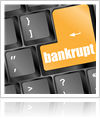
You may be considering bankruptcy for the very reason that you have lost a job. It may come as good news then that you do not have to be employed to file for bankruptcy. This is not to say that unemployment has no influence on the matter, however. It may make the difference in whether or not you qualify, depending on the type of bankruptcy you want to file. It is important to understand how Chapter 7 and Chapter 13 bankruptcy work. Before you pursue bankruptcy as a path to clearing up your financial future, it is also vital to know how your job status can affect either process.
Take Chapter 7 bankruptcy. In this process, unsecured debt can be eliminated, whether or not creditors are actually paid off. To be able to achieve this, you have to qualify through a means test. Your household income is matched up to the median household income in your state. If yours is below the state's median, then you are eligible for Chapter 7 bankruptcy. Under the right circumstances, you can still qualify if your income is above the state median. This is only if you can prove that you lack any disposable income. If you are unemployed, this will likely make it simpler to qualify through a means test. This may still be true even if you are still getting some sort of income, such as from unemployment benefits or social security.
If you are receiving unemployment benefits, you should probably include this in your means test as income. It should be noted that courts have been divided as to whether or not you must actually do so. Your unemployment income has to go on some part of your means test, however. If it is counted as income, then this still should not adversely affect the results. Even with unemployment benefits, your income will probably be much lower than any state's median.
Chapter 13 bankruptcy, on the other hand, is a reorganization bankruptcy. This requires you to pay off most of your debt. Some of your debt may get discharged, but the main bulk of debt you will have to pay off in three to five years. If you qualify, you pay off your debt through a restructured plan, which enables you to meet your payments every month. In this way, you can be rid of such debts as mortgage and mortgage arrears, and you can get your car loans crammed down. If you do not have a job, this may reduce your chances of being able to file for Chapter 13. You need to have an adequate disposable income to be eligible for this bankruptcy.
That being said, unemployment does not eliminate this opportunity altogether. Payments might be met through unemployment benefits and social security, for example. Perhaps you may still make money from a rental property, or you may have some other regular income. If you can demonstrate to a court that you will still be able to meet payments without a salary, you can go ahead with Chapter 13 bankruptcy.
To determine whether or not bankruptcy can help you, it is always a good idea to consult a bankruptcy lawyer. An experienced professional can help you find out if you qualify for either Chapter 7 or Chapter 13 bankruptcy. He or she can also help you understand the process and weight the costs and benefits. The sooner you act, the sooner you may be able to stave off further debt and get your finances back on track, even after a job loss. Call a bankruptcy attorney today!